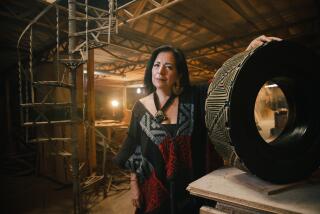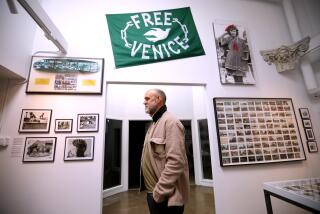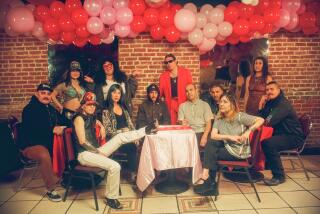How I Made It: Novica Chief Executive Roberto Milk
The gig: Roberto Milk, 40, is chief executive and a co-founder of Novica, which searches the globe for artists unknown outside their local areas. The Santa Monica company gives them an online sales platform and a forum for their stories. âWe have introduced people all over the world to crafts people and artists in the Andes â such as Peru â in Brazil, Central America, Mexico, India, Thailand, Bali and West Africa.â Novica employs 132 people, and Milk expects the privately held company to reach more than $20 million in revenue this year.
Enabling art careers: Novica says it has delivered $50 million in payments to nearly 17,600 artists. Products include 400 kinds of jewelry boxes, more than 1,300 styles of handbags and more than 900 oil paintings, just to name a few of the categories. Prices, which are set by the artists, frequently range from $17 to $250, but can rise as high as several thousand dollars. Novica is co-owned by National Geographic Ventures, the investment arm of the National Geographic Society. The company has partnerships with UNICEF, the online lending nonprofit Kiva, EBay Inc., Amazon.com Inc. and National Public Radio. Investors include Lions Gate Entertainment Corp. Vice Chairman Michael Burns, Scripps Ventures and the Grassroots Business Fund.
All in the family: Novicaâs co-founders are Milkâs actress wife, Mina Olivera, younger brother Andy Milk, childhood friend Charles Hachtmann and Oliveraâs mother, Armenia Nercessian de Oliveira, who gave up a long career at the United Nations to help with the business. One of Novicaâs first artisans was Milkâs Peruvian grandmother, Angelica Larnia Estratti, who knits botines, or slippers. Olivera often models the products and acts as spokeswoman. Milk often doubles as the company photographer.
Bred to help: Roberto Milkâs grandmother Juliet Milk served as a Methodist missionary. His grandfather Richard Milk was an agricultural engineer who used his expertise to aid impoverished people in pre-revolution Cuba. Milkâs parents met in Peru; his father, Robert, worked in the Peace Corps, and his mother, Rosa Maria, was a schoolteacher. âThey were a big influence,â Milk said. âInstead of teaching us to observe poverty, they would ask us, âHow could you change this? How could they make more money?ââ
Formative ventures: Milk, who grew up in California and Texas, said his family often traveled to Mexico and Europe but always on a shoestring budget. âWe were doing everything on a teacherâs salary. We would drive around in a rented VW van.â Milkâs family gave him an early awareness of the differences between rich and poor not only abroad but also in America. When his family lived in San Antonio, where his parents worked as teachers, Milk wrote an opinion piece for the local newspaper on the poor conditions at schools attended primarily by the townâs Latino students. He was a freshman in high school at the time.
Art appreciation: While his friends were collecting Star Wars figures, Roberto and his younger brother were developing a taste for unusual art. During their travels, they assembled a collection of preserved stuffed frogs from Guadalajara, outfitted as a mariachi band, complete with miniature instruments. âIt was really fun. Our room was filled with handcrafted stuff of questionable quality and taste.â
The light bulb: Milk, studying international relations at Stanford University, took a Portuguese class in his senior year. The language professor told the class about her experience buying some expensive Brazilian art. âI remember her saying, âThe international market is willing to pay these artists way more for their work, but the system doesnât work,ââ Milk said. âIt was like she was looking at me when she said, âSomeone needs to do something about this.ââ
Think huge: Novica was dreamed up in 1998 but didnât really get going until the next year. The first offices were the laundry room of Milkâs Santa Monica home and garages in four foreign countries. Its name comes from the Latin word ânovus,â meaning new, because it would be easily pronounced in many languages. âWe started small, but almost immediately we knew we had to go to National Geographic with thisâ to give the start-up greater financial muscle and a wider reach, Milk said.
The inventory challenge: Novica avoids brokers who want a commission, instead going straight to the artisans, Milk said. âSometimes you go door to door.... Itâs discovery at its greatest.â Milk said he has been interrogated at gunpoint, chased by irritated middlemen and has traveled to some of the worldâs worst slums. âIf you believe in what you are doing, you have to be willing to take risks,â he said. âWe were in a neighborhood in Lima, Peru, where the police are afraid to patrol,â looking for the maker of ceramic good-luck dolls called ekekos. âWe were traveling along narrow mountain passes where dozens of crosses mark where people died running off the road. And that was just last month.â
Personal: Milk and Olivera live in Los Angeles with their four children, 8-year-old twins Lucas and Ana Luiza, 2-year-old Matteo and 6-month-old Marcelo. The family often travels together in search of things to sell through Novica. The children specialize in spotting products for young people, Milk said, and are learning how to barter.
Twitter: @RonWLATimes
More to Read
Inside the business of entertainment
The Wide Shot brings you news, analysis and insights on everything from streaming wars to production â and what it all means for the future.
You may occasionally receive promotional content from the Los Angeles Times.











